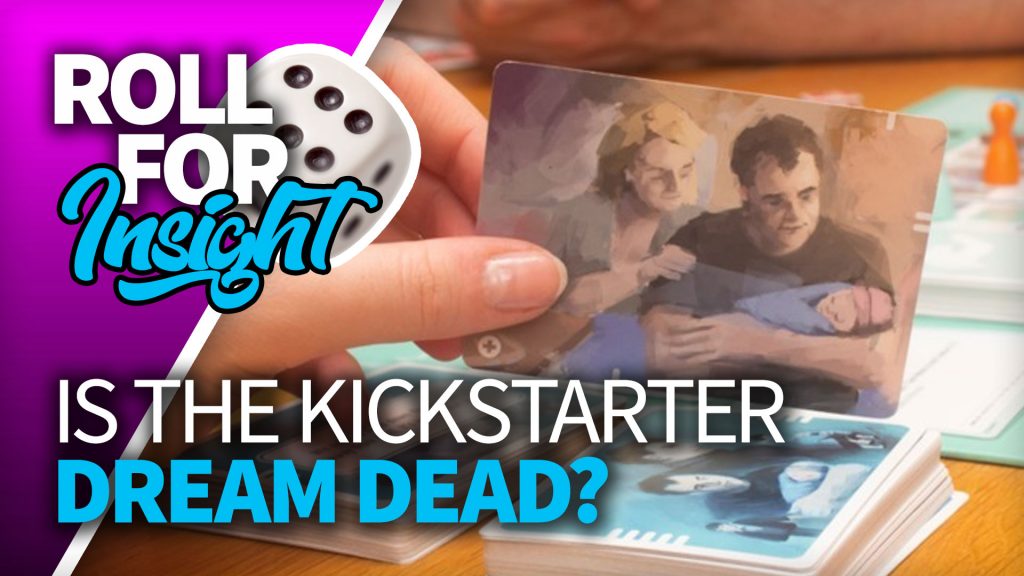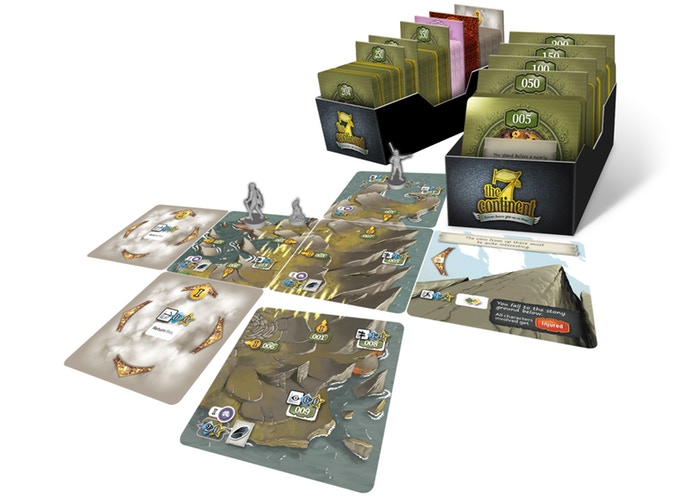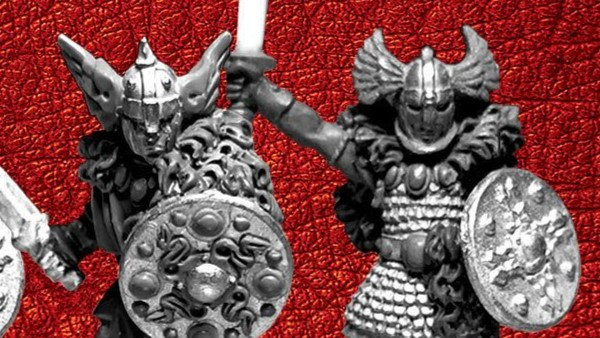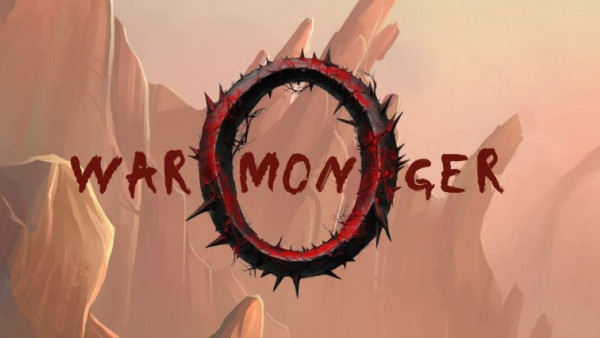Roll For Insight: Is The Kickstarter Dream Dead?
July 5, 2019 by cassn
Kickstarter symbolises a lot of what I love and hate about the contemporary gaming industry. Indie designers set out their ideas for hobbyists to enjoy in the hope that other people will find their concepts worthwhile. It provides accessibility, community feedback, and consumer choice. A communal, utopian crowdfunding Mecca (fused with late capitalist politics) which enables dreamers to build their dreams.

On paper, Kickstarter sounds perfect. However, in recent years the cracks have started to show. Debates have sprung up as to whether larger companies are abusing the system. Projects which have been funded and then never come to pass have left a sour taste in the mouths of backers. And companies trying to build a model purely on print-to-order sales are finding they are walking a tightrope between boom and bust, reliant completely on savvy marketing and consumer spending habits. So, almost a decade after it’s launch, I want to look back and ask: has the Kickstarter Age lived up to the hype?
I have always considered myself to be a board game addict. I can be distracted by a pretty component, subtly wooed with the promise of interesting engine-building mechanics, and easily lured into the back of a non-descript van at the possibility of a round of backgammon. That I exist merely as a vessel to consume as many gaming experiences as possible has become an inevitable part of my being that I have learned to accept. However, recently when tallying up my latest gaming purchases, I had to ask myself a new question: Am I also a Kickstarter addict?
A New Way To Create Games
Kickstarter launched back in 2009, and quickly became a global success story, with The New York Times calling the site “the people’s NEA”. As of May 2019, the crowdfunding company has collected over $4 billion in pledges from 16.3 million backers worldwide. Needless to say I am among them. Yet, while I religiously check Kickstarter for the latest cool, indie game to join my collection, my purchases don’t stretch to the dizzying heights of Reddit user Ranker2, who over the course of 2.5 years spent a substantial $16,000 on the crowdfunding website.
Ranker2, who since regrets most of his purchases, said his addiction was driven by a ‘fear of missing out’ (FOMO) on the Kickstarter exclusives, and being forced instead to pay the dreaded ‘eBay tax’ later on to get sought after extras. Indeed, Kickstarter exclusives and stretch goals have inadvertently created a tabletop gaming FOMO which has revolutionised how we purchase our gaming experiences. The concept of exclusive rewards, stretch-goals, add-ons, and the ability to go all-in on projects you love entices that greedy hoarder in all of us who fuels our hobby addictions. And, while some of our favourite tabletop designs make it to the retail market, increasingly the majority of games, miniatures, and hobby materials we want exist solely for purchase behind that bright green KS sigil.
Indeed, for many of these games, that’s how it should be. Without Kickstarter, few of these designs would even get off the ground. Bruno Sautter, designer of component-heavy Kickstarter success 7th Continent noted his epic choose-your-own-adventure game could only have existed through Kickstarter because the cost of manufacture would “prohibit a distribution through ‘classic’ retail circuits.” The print-to-order manufacturing process enabled by Kickstarter campaigns has allowed ‘big box’ games - laden with components, miniatures, manuals, and all other manner of extras - to become much more accessible and financially viable for both the consumer and publisher (provided, of course, you’re willing to accept the shipping costs!).
However, the size of the game doesn’t really matter. Any new designer or developer worth his dual-wielding dice is flocking to the crowdfunding site, which promises to handle the sale of projects for a minimal percentage, and on a promotional scale that few could achieve on their own. Pitching a new, indie concept for a solo card game in which you free magical animals and fight a dragon may sound cool, but to get it to sit in stores alongside Monopoly or Catan feels like an impossible feat for a new designer. Yet, with clever marketing and access to Kickstarter, games like Crystallo can change from idea to reality, and work their way into the hearts and homes of hundreds of backers searching for their next gaming fix.
A Changing Wind
It’s not simply indie start-ups getting in on the action and, alongside the little guys, the bigger, established companies are also selling their games. Some, such as Monolith, used Kickstarter as a pre-order method. Claustrophobia 1643 already had physical copies in existence before Monolith launched their campaign, assuring every backer got a copy and negating the very essence of the crowdfunding platform. Others continue to use the print-to-order system, despite having the financial freedom to go straight to retail.
CMON has come under criticism for their use of the Kickstarter crowdfunding model when they could afford to otherwise fund their publishing pursuits. Yet, while pedants could argue that bigger game companies are abusing a system originally created for start-up entrepreneurs, bigger name games on Kickstarter can be of benefit to all. Larger companies bring mainstream customers to the site, and indie developers often find they are being backed by those who originally visited the site for more well-known franchises.
However, even with the bigger companies, success isn’t assured. Last year CMON posted a revenue loss of $4.1 million, despite releasing more games via Kickstarter than the previous year. As CMON fan Chris Renshaw points out, this is partially due to these games proving less popular on the market than their predecessors. While the company still boasted a substantial profit, it seems that Kickstarter is not without risks, and companies who choose to crowdsource their funding need to be able to swallow significant losses when they occur.
This fact has proven the greatest downfall for the Kickstarter golden goose, and the current hot word in every contemporary gaming discussion is sustainability. Crowdfunding may be able to provide an initial success but profit margins are often slim, and with tabletop designs battling for backers simultaneously, the Kickstarter market has become fiercely competitive and customer loyalty fleeting.
Moving On & Proving Yourself
In such a cutthroat industry, even a company who has successfully pushed a few games through the Kickstarter machine may find that one bad campaign sinks their business. Some publishers, like HUB Games, have chosen to avoid the site altogether, choosing instead the tried and tested methods of promotion and retail sales. Whether such traditional models can survive against the Kickstarter megalith will be revealed in due time but, certainly in the case of HUB Games, their innovative game design and attention to quality have proven incredibly popular with gamers without building on the crowdfunding bubble.
And, at the end of the day, it’s the gamers that make the market. While Kickstarter exclusives may provoke that internal dragon that wants to create his hobby horde, and clicking that backer button gives us that sweet serotonin hit, gamers remain relatively discerning in what they choose to play, and not all concepts will make it to the finish line.
However, Kickstarter failures that never got off the ground do serve an important function - they show what Kickstarter really is. Because Kickstarter doesn’t sell games, it sells dreams. Behind every project, no matter how big or small, there is a designer, developer, artist, sculptor, publisher, or writer who is hoping that the blood, sweat, and tears they shed in the pursuit of their design was worth it. And for every backer that clicks that button, they know it was.
The gaming industry has always been full of dreamers. People with a glimmer of a concept, a spark of creativity, and not a lick of common sense who, against all odds and advice, throw themselves into developing something extraordinary for others to enjoy. Kickstarter perhaps wasn’t the world that was promised, but utopian, socialist idealisms rarely live up to their hype. However, more than a decade since it’s conception, Kickstarter remains a place where dreams can become a reality, and that’s enough for me.
What do you think? Has Kickstarter lived up to its promise?
Supported by (Turn Off)
Supported by (Turn Off)
Supported by (Turn Off)





























![TerrainFest 2024 Begins! Build Terrain With OnTableTop & Win A £300 Prize! [Extended!]](https://images.beastsofwar.com/2024/10/TerrainFEST-2024-Social-Media-Post-Square-225-127.jpg)


















































I’d say Kickstarter (or rather crowdfunding as a concept) has matured and become yet another tool in the box of those wanting to start a new business or fund a new product. It comes the price that new kickstarters cease to be as magical as they used to be. IMHO this is a good thing. It is easier to spot flaws or challenges as a result. And it makes it easier for those starting on the road to get help or at least learn from others that have gone before. The kickstarter exclusivity and the insanity of stretchgoals is something… Read more »
I pledged to a good few games over the last few years. It’s easy to get sucked into the hype… but often the end result is massively delayed, or not as good as you expected. I’ve asked for refunds on a number of items and lost a bit of money that way, but if those games actually get to retail they are usually cheaper anyway, albeit with less ‘free stuff’ (which the game makers have budgeted for in general and the free stuff is often extra plastic that adds little to the game). One of those that I had to… Read more »
I have never considered Kickstarter to be anything post-capitalist or what socialist idealisms relates to crowdfunding. Something for me to ponder (perhaps my on views on it are too entrenched and my world view too black and white) because in my mind, crowdfunding is capitalism in its purest form. The websites are just markets, they bring together two sets of agents, producers (fundraisers) with consumers/investors (funders). There is little to no regulation or protection. The decision to fund is based solely on the decisions of the funders so whether the product makes it to market is based on the “actual”… Read more »
it’s capitalism….you take a risk in investing and sometimes it doesn’t live up to the hype or pan out….other times…it’s a home run. invest only what you can afford to lose and if you come out satisfied….it was a success…is eberything in life a success…no…then it’s doing it’s doing it’s job.
I do think that KS itself should take some responsibility for projects.
As it stands, they take their percentage and don’t give a crap if the project is ever made… they get paid that’s all that matters to them.
I’ve seen some bizarre projects started…
One guy wanted money for dope…
Another had a busted computer and couldn’t afford a new one so was begging for money…
Both of the above were in the ‘gaming category’.
Since 2013 I have backed 55 projects, mostly games but a couple of film projects also. This is my record as of now. 2 Failed to Fund 2 Have been written off as failed projects 4 Still in funding period 2 Shipping as we speak 2 still in Development 43 Delivered To date I have not received a kickstarter that was significantly different from what was originally promised.I would say that it has lived up to, and is still living up to, its hype. I won’t detail how much I have pledged on any of these kickstarters but I can… Read more »
Same here.
Zero regrets despite failures and successes not always being perfect.
Success rate of backed projects vs ones that failed after funding is pretty good given the kind of risk involved.
One has significantly changed design, but that was because a design flaw was discovered after production prototypes were delivered. We rarely get to see the original design before things hit retail, so we rarely know if there were drastic changes at all. Kickstarter allows us to see as much as the creators of the projects are willing to share.
From the other side of the looking glass, I was part of a group that had a successful KS, delivered on time and supported for it for a few years. It helped create a game around a friends dream and was something we would likely have never have done without that format due to the years it would have taken for us to save the funds for the initial layout. That being said when we approached retail companies to try and support the independent stores they wanted 40-50% of RRP so they could make something too and the fact that… Read more »
That is another important thing that people forget : the entire supply chain between factory and retailer adds a lot of cost with practically zero visible effect.
There’s a good reason why companies like GW have their own stores …
I think the biggest downfall of the KS schemes is that they come thick and fast (sometimes from the very same company), this along with FOMO leads the games systems being bought (perhaps before players are ready) and then perhaps played a few times only to languish on the gaming shelf forever more. Yet the games that are played on a regular basis at my club are nearly always the ones that have a strong and continuous retail position. It’s this availability to buy when you want (rather than when the KS is running), to buy as much as you… Read more »
Depends on the game. Games that are self contained (such as those provided by Monolith) that don’t need any ongoing retail support are far more likely to be played than games that encourage players to collect and build armies and thus need retail support od some kind
Well here’s one chaps thoughts on “how” gamers get caught up in the KS schemes
https://www.youtube.com/watch?v=oZjiL501lAY
That may be true, but I am unsure as to how that relates to self contained games not requiring ongoing retail support.
Because I’d disagree with your assertion that self contained games purchased via kickstarter are more likely to be played that games purchased via retail from my experience from games down at my local club perhaps?
I didn’t specify your local club, I made a general statement. If your club is different I would say you’re probably an exception, not a rule. However, be that as it may, a video about encouraging irresponsible financial behaviour when promoting kickstarter or predatory tactics being employed by kickstarter creators has very little bearing on the longevity of a product produced via kickstarter.
We keep having this “clash” every time we post in a thread about kickstarters. The video posted was about how a gamer WAS having second thoughts about backing a KS (and why). And perhaps it’s happening to more and more gamers. Numbers ARE dropping (either because of fierce competition or just KS fatigue with gamers amassing a large amount of unpainted plastic). Don’t get me wrong, I back KS schemes. I’ve been lucky and not had any fail on me. But I do feel it’s either caused a flash in the pan of interest at our club and/or fragmented players… Read more »
And that still has bugger all to do with my point about games that are self contained getting more play time post kickstarter than those that inherently require retail support (i.e. Wargames that rely on players constantly buying new miniatures). You’re not necessarily saying anything that is incorrect, you’re just not addressing the original point I made I backed conan because of the miniatures, I kept it because of the miniatures but the game is well liked among my gaming group and so it gets a lot of play time. We will regularly spend a night playing Conan as a… Read more »
Well games like Bolt Action probably get more games down at the club than any of the Kickstarter ones I’ve seen being played. Games like Star Wars Legion also seem to be getting popular. I don’t think any KS game get more playtime than games that are offered at retail (Warlord Games seem to be in vogue atm as they are very obtainable from multiple sources and in stores). Some of the self contained games also require a pretty hefty spend (well you “could” get the basic box, but then you’ll never be able to get the expansions after the… Read more »
If you’re in a club that specifically plays wargames then you’re highly unlikely to play games launched in kickstarter, because generally speaking they don’t do so well, for a number of reasons. However the article addresses boardgames and wargames and there are far more of the former on kickstarter than the latter. And board games do not require any ongoing retail support.
People need to stop looking at Kickstater as a Pre-Order and a lot of these issues would go away. You’re gambling that the creator can both get it done and get it done well. Far too many people just blindly hand over cash without vetting the company beforehand. I’m not a big Kickstarter guy I’ve only backed Four and had a great experience. In Search of Hannibal – A Graphic Novel by Lindybeige is two years late but I could care less since it looks amazing and they’ve been 100% honest about why it’s late with very legitimate reasons (your… Read more »
Oooh I did get a copy of War of Rights on Steam (I’d never heard of the KS). It’s definitely a niche game that no publisher would have touched, yet is probably the finest blackpowder FPS/Sim made to date (and definitely worth a look at if you are into ACW in any way). It’s got some very clever game mechanics to “encourage” the player to fight in formed units (rather than running around like Rambo). Alas has it got the commercial legs to grow beyond the initial interest? On that I don’t know (it’s definitely not your usual FPS). So… Read more »
@cassn I truly wonder if Kickstarter has seen it’s ‘Golden Days’ already. With the number of ‘Failed to Deliver’ but succeeded in funding projects, I feel we could be only a stone’s throw away from a major lawsuit from someone with deep pockets that can convince a Lawfirm that there is big money to be had by taking Kickstarter to the cleaners. I’m not a lawyer/barrister but it seems like somehow someway it could be proven that they know that some of these companies don’t have the talent, experience, or staying power to see their promises met. At the very… Read more »
@templar007 The main argument that a crowdfunding website will give is that they only provide a place for fundraisers and funders to meet, and it is up to the funders to do the due diligence before they provide the funds. Crowdfunding platforms will cease to exist if they have to vet the projects. I would fear that the more regulation and risk placed on the platforms will be the end of the platform and I am also a proponent of the notion that I am a better judge of how I use my own money for my betterment than anyone… Read more »
Where are you getting the statistics of these ‘failed to deliver’ projects ? To me it reads like people are taking the failure of a single kickstarter delivery and multiplying it because lots of people scream about it. Every single project that I’ve backed and that has ‘failed to deliver’ to date has been one that would have failed to become reality no matter what was used to fund. The only consistent thing is that there are significant delays and practically every single one of those delays is the result of an external factor (samples needing multiple iterations, chinese new… Read more »
@limburger people perceived rates of failure is probably related to the human minds propensity to remember the bad. Similar to poker or games of chance, we remember our bad beats and terrible dice rolls more than the times we get insanely lucky. I’ve backed 67 kickstarters and none have failed to deliver something so far. There have been some major disappointments – the quality of figures in Sedition Wars comes to mind but overall I have been very happy with my “investments” .
@limburger the problem is, how do you define “failure”, believe it or not it is quite subjective. Also, once the funding period is over Kickstarter have very little involvement or visibility of Projects so tracking the success of Projects would be a fairly difficult task with potentially unreliable or misleading data.
@onlyonepinman I agree that tracking any post kickstarter results is iffy at best. I’d define failure as ‘not delivered and/or not functional at all’. Anything else is more of a quality issue, which can be both subjective (when dealing with the creative aspect ie : does a figure look ‘good’) and objective (broken or missing components or potentially lethal defects). Things would be easier if every crowdfund project had retail delivery as a goal, because then legal standards could make them more visible. Part of the problem is that crowdfunding tends to focus on niche markets which rarely achieve public… Read more »
It’s a tough one for me. I do think some bigger companies sort of use it not as Kickstarter was intended, it’s more of a x amount of units and then we’ll send it to them. The other side is the actual indy sort of companies/people who use it and get their games out there really need that help because physical store space is so small and having to go through a distributor wouldn’t help.
I think it’s a good thing,but I do think it’s abused more often then not.
I really think Kickstarter should guarantee refunds in instances where untrustworthy creators never had no intention of delivering any goods to backers. Personally, I’ve found European companies pretty reliable on kickstarter, but some American companies pretty shocking in how they treat people. They probably assume they are too far away for any effective action to be taken against them. I’ve backed 39 Kickstarter projects over about 6 years. I’ve had problems with about 10 projects not delivering everything they promised. I’ve had 4 not deliver anything – all 4 of these were based in America. At the end of the… Read more »
So 10% of the projects you backed failed to deliver and another 15% were missing something.
Could you imagine the reaction if the likes of GW or Amazon failed to deliver with percentages like that?
People accept KS projects failing to deliver… it’s part of the risk they say… that’s crap… KS need to be accountable…
Part of the percentage they require for hosting should go towards insurance… if a KS project fails to deliver… KS should refund the backers.
I couldn’t agree more. I’ve had really terrible luck on kickstarter.
But I’ve had to let it go and move on, if only for the sake of my blood pressure.
For kickstarter to offer any kind of indemnity for Projects funded on their platform they would have to increase their fees to cover that. This cost would be passed on to backers and the platform would become unfeesible. The entire point of kickstarter is to transfer risk away from creators and onto the backers. Instead of creators taking on thousands of dollars/pounds/euros of risk, each backer accepts a percentage share of the risk. Where people might be less inclined to take on the full amount of risk as a creator because it potentially ruins lives when it goes wrong, people… Read more »
That’s basically the same disclaimer betting shops use.
Don’t gamble more than you can afford to lose.
However… when you visit a betting shop you don’t tend to wager more than a few pounds and you expect to lose…
The odds of winning a long shot are remote, but the rewards can be life changing if that long shot comes in.
With KS you’re often paying hundreds of pounds for a reward worth only what you pledge (or perhaps a little more), so the rewards are not as great and certainly won’t change your life.
Kickstarter is a form of gambling But the odds of kickstarter failing to deliver are significantly lower than the odds on most horses. So you place your stake accordingly. If you bet £100 on a horse with odds of 2:1 it’s not a life changing amount – you get £200 back so you’re £100 in profit. If you back a kickstarter with £100 the odds of delivery are actually quite high so therfore the rewards for your £100 stake are also not life changing, you might get £200 worth of stuff. And because it’s a form of gambling it quite… Read more »
Kickstarter could do better to protect backers as they became a Benefit Corporation in 2015. That lets their board set goals with interests other than profit for shareholders. While they haven’t included anything specific in their Charter, it is certainly within their power to do so within the framework of their corporate structure.
But wbat could they do? They have to keep the platform attractive because they’re not the only platform available. I think a lot of people are drinking from a poisoned well when it comes to kickstarter, perhaps because they have been burned. The majority of kickstarters that fund, deliver. If they did not, kickstarter would have been investigated by the US government or its agencies by now. However projects that deliver don’t create news, kickstarters that fail do and it becomes a massive thing that everyone has an opinion on. Once funded, kickstarter projects have a very good delivery rate… Read more »
But when it fails, the backers lose out, not the creator,so no risk to them.
The creators still get the money and can try again.
There are window installers that use the same system. Sell windows to people. Give a delivery date. Declare bankruptcy and as a limited company they get away with not paying customers back and do it all over again with a different owner of the company.
Not saying all ks have criminal intent, but there are some.
It’s deliberately done that way. Crowd funding is a transferal of risk away from the creator and onto the investor. If it didn’t transfer the risk it would not be useful.
As a child who lived through most of the 1980s with siblings of a similar age I have always considered myself fortunate to have lived in a household where tabletop gaming was on the agenda almost every weekend. If it wasn’t, it was only a matter of asking and something would be cracked open and played. Failing that a simple card game or Lego was a nice change of pace/Plan B. My mum’s extended family is the close side and with 9 similarly-inclined cousins I have very fond memories of games of Risk lasting for weeks because they were set… Read more »
A lot of good points made in the article. This – or really the board game bubble in general, in which KS contributes to – has been a topic of discussion for the past year or two. I’m not sure the KS “dream” is dead. Nor am I sure if it’s lived up to its “promise” (did it promise to always get you successfully funded?). But I think where it’s at now in the board game ecosystem won’t change. It’s a risk and now designers/publishers KNOW that. But sometimes (they feel) it’s the only way to get a board game… Read more »
great article, thanks @cassn
Steadily increasing shipping prices are hurting small businesses, with KS not an exception. Small businesses are also fighting against state taxation laws, a regulatory burden. I would say that, after customer reactions to CMON Bloodborne shipping, that KS projects will still need to subsidize shipping costs, such as by hiding the cost of shipping in the initial pledge. Yet this is still in an environment where Amazon, Miniature Market, and other retail online stores can offer “free” shipping (by hiding the cost in the product), not to mention immediate (or at least not as long of a wait) shipping, no… Read more »
Kickstarter is neither good or bad, It just is.
The tool that is kickstarter may have changed, and re-used in different ways, but it is still a selling tool.
One great advantage of kickstarter is that the developer can change the product before going into expensive supply mode and producing something that the market is not 100% behind.
Use kickstarter as you wish, but beware what and how the concept is marketed.
I remain a big fan of Kickstarter although I’m using it a lot less now than in previous years. I still think it’s been and remains a great way to get a lot of products made that would not any other way. That goes for small, indy projects as well as larger games or miniature lines by more established companies. To the extent that larger companies are crowding out smaller, indy offerings, I dont’t think is is much down to crowdfunding. It’s just the nature of many people wanting to play games that they know other people are playing /… Read more »
I don’t think you should be upset about this. I’m sure there are a bunch of different ideas and ways to develop and promote. For example, you can see detailed information on the subject on the site https://www.owox.com/blog/use-cases/customer-lifetime-value/. I am sure that after reading interesting articles, you will gain a new understanding of Google analytics and promotion in general.